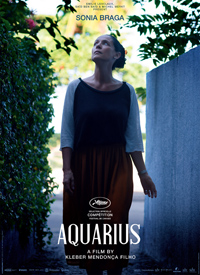Reviews
Aquarius | Review
Sign of the Times: Filho’s Formidable Examination of Life as a House
 For his sophomore effort, Brazilian director crafts an intriguing character study around a brazen Sonia Braga in what is possibly the most magnificent role of her career with Aquarius. Breaking out in 2012 with his feature debut Neighboring Sounds, which focused on a neighborhood in Recife with intersecting narratives of several residents, he distills his storyline to this tale of a widow who’s a retired music critic being pressured to move out of the eponymous apartment house after her building has been purchased by an aggressive property developer. As equally detailed composite of class issues as his previous film, this subtle cauldron, divided into three distinct segments, sets on simmer until a powerful third act sets the anger ablaze.
For his sophomore effort, Brazilian director crafts an intriguing character study around a brazen Sonia Braga in what is possibly the most magnificent role of her career with Aquarius. Breaking out in 2012 with his feature debut Neighboring Sounds, which focused on a neighborhood in Recife with intersecting narratives of several residents, he distills his storyline to this tale of a widow who’s a retired music critic being pressured to move out of the eponymous apartment house after her building has been purchased by an aggressive property developer. As equally detailed composite of class issues as his previous film, this subtle cauldron, divided into three distinct segments, sets on simmer until a powerful third act sets the anger ablaze.
Clara (Braga) is a 65 year old widow, a mother of three successful children and a retired but well-regarded music critic. Born into a prodigious family in Recife, she has a rich history wrapped up in her beautiful apartment located in the two-story beach-side apartment complex known as the Aquarius. Located in the upper-class Avenida Boa Viagem section, the property, which has existed since the 1940s, has been bought out by a company which has major plans of renovation. As such, all of her neighbors have accepted the generous offer provided by the company except for Clara, which has angered a lot of people who can’t collect their agreed proceeds until she’s out of the building. Her comfortable existence is suddenly shadowed by growing anxiety, leading Clara’s routine to be interrupted, causing a reevaluation of things and people she holds dear.
As the resilient and fiercely independent Clara, Sonia Braga is magnetic, recalling the visceral capacity of Anna Magnani as her anger intensifies. Filho’s film is a significant homage to her talents, and there’s never a moment when Aquarius underwhelms, whether a series of comfortable interactions with those whose company enjoys, such as the local life guard, her nephew who shares a similar passion for music, her housekeeper, or more vibrant moments where Clara invites a young gigolo to her home after she peeks at the blaring orgy going on upstairs as an attempt to intimidate.
Our personal space and how we control it, which includes who and what we let into it, becomes the overriding motif of Aquarius. Details about a sticky fingered maid, along with other peripheral details, all seem calibrated to underline the notion of privilege and control, such as who has the ability to even consider turning down an offer such as the one presented by the disingenuous Diego (Humberto Carrao). And this is exactly the point—how we’re able to control the comfort of our space dictates (and dominates) quality of life. Clara’s love for music is also used to solidify these themes. Among the many tunes in the colorful soundtrack, two tracks by Queen stick out, including in the 1980 set opening sequence, and then beautiful use of “Fat Bottom Girls,” which she uses to drown out the sound of obnoxious carousing, reclaiming control of her environment.
Music is also used as a vehicle to collapse time and memory, which relates to the film’s display of objects as powerful instruments of transportation. During a dedication to Clara’s aunt in the first segment’s birthday celebration, the woman lapses into a memory of a sexual conquest on the cabinet located behind the orator. Filho proves his point repeatedly with the same cabinet, figuring prominently in several frames, a reminder which simultaneously reverts the film’s audience to these same memories from earlier in the film. As such, the notion of ‘time travel’ is conveyed as an invisible yet intrinsic aspect of human experience, which can also be shared, looped, and endlessly continued.
Technological advances in how music is shared also becomes an interesting sub-tangent within the film, as Clara is grilled in an interview about her comfort with MP3s due to her acknowledged collection of LPs. Her answer is an astute one—the method by which we continue to experience music is not so much a problem, but something tangible is lost when these progenitors of memory lose their aspect of physicality.
But where this drifting narrative really starts to take shape is in the third part, “Clara’s Cancer,” where tension begins to breed the threat of danger to Clara. There’s a significant reveal best left undiscussed prior to seeing Aquarius, since it’s devious and chilling, particularly with how Filho visually unveils it. Additionally, this paves the way for an absolutely superb finale and a phenomenal closing line from Braga.
Reviewed on May 17th at the 2016 Cannes Film Festival – Main Competition. 140mins.
★★★★/☆☆☆☆☆
Los Angeles based Nicholas Bell is IONCINEMA.com's Chief Film Critic and covers film festivals such as Sundance, Berlin, Cannes and TIFF. He is part of the critic groups on Rotten Tomatoes, The Los Angeles Film Critics Association (LAFCA), the Online Film Critics Society (OFCS) and GALECA. His top 3 for 2021: France (Bruno Dumont), Passing (Rebecca Hall) and Nightmare Alley (Guillermo Del Toro). He was a jury member at the 2019 Cleveland International Film Festival.
























